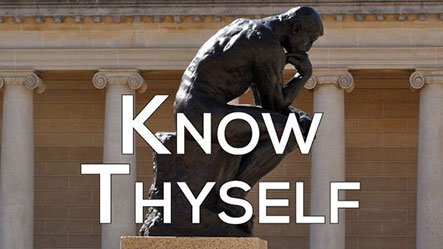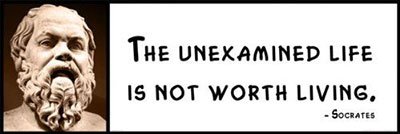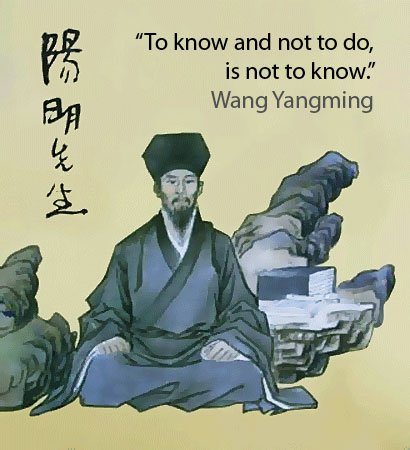Have you ever wondered if there is some journey for us humans to take?
Have you ever wondered who you are?
How much do you really know yourself?

There is a so-called "spiritual" (consciousness) journey and search for truth through knowledge and understanding. When we search for truth, we also search to understand more of who we are; a search for answering the question “who am I?”/“who are you?”: to know-thyself.
We have several layers combined to make us who we are.
We all have a unique individual body as part of who we are. The body is the basic primary substance that exists in itself -- physical, material.
We also all have consciousness functionalities and capacities in common as part of who we are -- which we can also develop upon. Consciousness is the secondary substance -- nonphysical, immaterial. Some of who we are is in our conscious control, while some of it is unconscious or subconscious, with drives and motivations taking us in certain directions in life. We all have thoughts, emotions and actions as part of the functionality of who we are.
Individually, we also all have an ego-personality-identity construct and worldview that is unique to our personal experience and knowledge attained -- nonphysical, immaterial, but more epigenetically formed from our environment in life.

If you don't examine yourself, you don't know yourself, and you don't live an examined life. This involves the individual particular self we each are (ego-personality-identity), and the common universal deeper aspects of who we all are, the consciousness, psyche, mind, self or so-called "soul" or "spirit". We have the general "spirit" of consciousness with the capacity to learn, and there is living by the "spirit", i.e. morality.
Morality is the "spirituality" that matters, morally acting is the "spiritually" activated state that matters, and being more moral is the "spiritual" state of being that matters.
The “spirits” within are the “gods” and “deities” that control us: our unconscious drives and motivations. These are the "unseen" forces within. The "gods" and "deities" of consciousness within us have been externalized, objectified, reified, projected, personified and anthropomorphized through metaphor, analogy, symbolism, mythology, narratives and stories, used to attempt to explain and make sense of aspects of ourselves and of reality itself. Higher order consciousness is the higher "God/Spirit" that can rule over the lower "gods/spirits" of our lower order unconscious aspect of being (our conditioning and automated responses). Go look at Ancient Egypt, Greek and Rome to understand how we expressed knowledge about the human condition (who we are) through gods and deities. Then the power of belief took symbolism as literal, further confusing consciousnesses.
Humans invent many beliefs to try to explain what is going on. Some can be validated through being demonstrated and verified by reflecting aspects of reality. Yet many beliefs only exist in our subjective imagination, not objective existence. When we realize and admit we are wrong about many things we thought we knew, we can awaken from our somnambulist state of thinking we're deeply thinking, and thinking we know 'who awe are'. We think we know what we do -- what we're doing -- but most of it is conditioned through automatically and unconsciously reflecting the environment we are influenced by (other people, their behavior, etc.). We are largely thinking and behaving in unthinking ways, not really evaluating what we are truly doing.
What we do as we manifest our consciousness through action and behavior, is a part of who we are. If we don't know and understand the conscious and unconscious drives and motivations that have us think, feel and act in certain ways, then do we truly know that much about ourselves? No. We might know who we are as a unique individual ego-personality-identity construct that differs from others, but not the other aspects of what makes us who we are; the deeper parts of how we function.
Action and behavior is the end-result manifestation of who we are. Behavior shows others who we are. We can be fools or be wise in action. Knowing thyself involves knowing if our actions are wise or foolish. We have the capacity for self-reflection, analysis, introspection and contemplation. We can change our ways away from foolish wrong-action towards wise right-action.
Wisdom is doing something with what you know and understand. If you don't act on what you understand to be right, then you don't really understand the responsibility that comes with the knowledge and understanding of what is right to do. Changing ourselves or the world for the better requires being responsible for our actions and learning to choose the right over the wrong.

“To know and not to do, is not to know.”
- Wang Yangming
What we do involves moral behavior. Do we act rightly, or wrongly? We have to make the choice based on our limited or deeper understanding.
Consciousness has conscience which deals with moral living. We have consciousness as the primary "spirit" (both higher "Spirit" and lower "spirits"), and then we have conscience to develop more moral understanding for how to live (the "spirit" of living right, good and true). The search for truth and the quest to know thyself more, will lead to the deeper care for moral truth and the understanding that we are beings that strive for moral living. The quest to know thyself leads to understanding the importance of morality and actualizing and realizing it to deeper degrees in our lives.
So then, what's the purpose of human consciousness? To be more moral. That's how we become better, truer, realer and higher potential versions of ourselves. That's how we evolve consciousness and humanity. That is all our purpose and goal. That is the potential power of consciousness we all have.
We have been doing this unconsciously for thousands of years. Go look at history, it's one continuing battle of people creating evil, creating good, and stopping evil to allow more good to manifest. We strive to do better, to be free from harm and the oppression of immoral people and their behavior. I think it's time for us to put morality at the forefront of our conscious awareness and strive to actualize more morality. What do you think?
Yup, somnabulistic state, that's the general level of consciouness currently extant on our planet. It's as though people only think they're thinking, when in actuality they're merely watching their characterological reactions to objective stimuli in real time. One gets so comfortable with that situation it appears the discursive waking consciousness is in control, when as inflected by your wisdom posted here, one needs to self-examine to truly find the path to higher consciousness.
I distinguish between thought, knowledge and belief. All beliefs are subjective and do not necessarily conform to reality, so for me beliefs function as intentional holding patterns while a pragmatic metaphysics is being discerned.
It's good to hold differing beliefs concurrently as a meditative exercise. For example I believe I'm on a planet circling a sun, as the science I've learned provides fair indication, but I also believe I'm on a planet in the center of the universe and everything revolves around us, as we directly experience, as all life responds directly to the comological tropisms (and there is amazing science to that as well). So I can easily believe both, and ponder what can survive the clash of the ideations. For therein reside golden nuggets of knowledge adumbrating advancement beyond the discursive.
Man created by god is as the most perfect being, with perfection is god giving us free will.
Given the intellect and lust, humans can already determine the intended direction, whether to go left or going to the right. Angels are holy beings who never violate the command of god, and demons are creatures who want to plunge people in error, and we as humans have both. So where we are..?
I think the terms "Good" & "Evil" in today's society are:
not comprehended by the vast majority.
subjectively applied, "good" is what I like & want; "evil" is what I don't like or want.
Manipulated by those who have something to gain from it.
The technology available to people today would allow them to find "truth", but it's so much easier to look and see what Kim Kardashian is buying, wearing, doing, driving.
I have to sadly agree with @chhaylin's post yesterday that the masses are not ready for freedom.
Yeah, much like people don't get what is meant by "good" in terms of "good and evil", they don't get what "truth" means when used either. It's true that Kim Kardashian is buying, weareing, etc., but it's an irrelevant truth that doesn't have value or utility in life. Higher quality truths are what mater, like moral truth the most.
There is also the word "quality" that I use to refer to content, meaning he quality of the information in the content, i.e. if it has quality truth that can have utility in our lives. Some people just don't get what "quality" is, and make it personally relevant to them alone, i.e. "subjective quality". Quality information can be objectively discerned because it has utility in life, like moral truth affects the quality and condition of our lives.
Great point, thanks for the feedback.
Thanks for inspiring the thoughts.
Sadly I think that there are an abundance of people for whom there is only one quality, and it is "subjective" in it's nature.
Maybe it's a backlash/overcompensation from generations of people being sold on doing something for "a greater good", which always seems to have lined someone's pockets.
Wow, you've dredged up a quote I read about 30 years ago.
I've learnt a lot... thanks for sharing! "If you know your enemies and know yourself, you will not be imperiled in a hundred battles... if you do not know your enemies nor yourself, you will be imperiled in every single battle." - Quoted from The Art of War
Great post.
What a profound article. Knowing about oneself is recognizing oneself and living a true life with consciousness. I agree that, without analysis and introspection to try and understand what drives us and what motivates our actions or thinking, we truly would not know ourselves. Thanks for sharing your thoughts on this topic. Really appreciated. Upvoted.@krnel -
At my end, I continued my observations of nuggets of wisdom from wildlife and wrote a blog 'Dueling Duo - How Impalas manage conflict' with my wildlife photos and musings with a twist. I would be honored if you to take a look at it when you have time. Your comments, as always, would be an encouragement and incentive for me to make better blogs. Thanks
Great post!
On the objective existence; have you ever seen "the bible of Mithra"? It's on youtube and the guy reads the book he wrote, I really liked it, great info IMO.
Thanks, and I'll go check that out.
Cool, I hope you like it :)
Knowing oneself is one of the hardest things in life, so many secrets we do not dare reveal even to ourselves!
Indeed, it's complex and facing the mirror is hard to do often. People don't want their illusion destroyed ;)
Greatest post I have read in recent times @krnel. This is so educating mate. 👍 @kayceesuave
thanks, glad to educate ;)
Very good and interesting read, people definitely need to be more conscious🕊
Lovely post on topics near & dear to me. I totally agree with you. As Socrates said, "Knowing the limits of our knowledge is the beginning of wisdom." For the last 8 years, I have been teaching ethics at the college level, trying to impart pretty much the same message as you - that self-knowledge is the key to eudaemonia (flourishing/happiness in ancient greek). Thanks for the great post!
You're welcome.
I think this is what Jordan Peterson is getting at in his lectures: that examining the world with a scientific toolkit alone isn't enough to generate value and give us a reason for living (and why the literal creationists fail when they try to examine the bible with scientific thinking). We need more than one way of looking at the world, just as we need different sets of tools as we try to address different kinds of problems. As you say,
But I don't think it's been entirely unconscious. We are conscious of it when we tell stories and develop mythologies, and use those stories to pass these values to our children and disseminate them out into the culture.
Anyway, your post is well expressed. I'm thrilled to find the Internet filling up with a broader expression of ideas these days.
Thanks for the feedback. I meant we are not seeking to know thyself consciously to learn actively about morality, we learn after the fact with 20/20 hindsight vision to learn form our mistakes, true. We, humanity, have been unconsciously striving for morality as we find it present. But I mean the forsight to guard and protect against making future moral mistakes.
Humans are not yet conscientious.
They need to be good without any fear of punishment...
Yes, we need to not be bad because it's the right thing to do, not because we fear the consequences of doing it.
I agree with this post, this affect all of your life. For instance basketball if you know your self you can be confident to win.
Great post. I love long form articles like this. Keep it up @krnel!
Another great post from you @krnel ! Deep meaning... knowing thyself... the path to self-realization, knowing who you are, what you are deep down, and ultimately meeting yourself and surrendering to your consciousness. Just the thought of this is enlightening! Great thoughts!
Thanks ;)